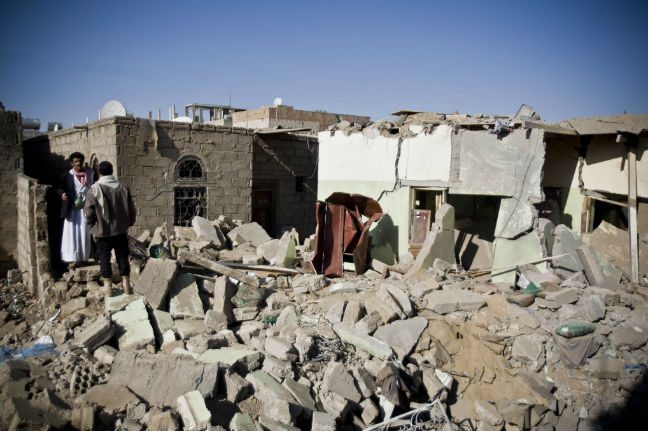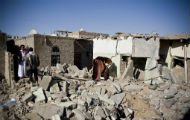
With the escalation of conflict in Yemen now in its second month, the country is now in the midst of an unfolding humanitarian catastrophe. Water supply systems have been heavily damaged, food prices are spiralling out of control, and more than 300,000 people have been displaced.
Ongoing violence is pushing the country towards economic collapse, making life harder for the 16 million people who already in need of humanitarian aid prior to the recent escalation in conflict.
Oxfam program officer Bassim describes how the crisis has changed his life.
It is impossible not to worry about my country and the human suffering that the war has caused as I live and work through this awful period of Yemen’s history. That’s why I want to share my story. Latest figures tell us that over 640 people have been killed during the current crisis, including more than 300 civilians, and over 2,200 have been injured.
As a result of the ongoing conflict, I was forced to move my wife and children from Sana’a to the countryside where I grew up. Relocating my family at a time when there is no fuel and no safe roads to travel by was an unbelievable tragedy for us. My children cried all the way and my wife was very afraid of the sudden changes in the midst of this ongoing war.
Before the current crisis, over 60% of the population — 16 million people — were already in need of some form of aid. Now, people are facing even more drastic changes of fortune. People’s incomes have dropped dramatically.
My life has changed completely. In my village I have to try and find flour and other food to make sure there’s enough for my family’s needs, and fuel. It is a story I can see across the country. Even before the crisis, more than 10 million Yemenis did not have enough food to eat, including 850,000 malnourished children. In some areas we are even reaching emergency levels for acute malnutrition rates.
Before the crisis over 13 million people didn’t have access to clean water –who knows how many don’t have access now.
So many things are different now. Clean water is a huge problem for us, as water systems have stopped because of the fuel crisis. Before the crisis over 13 million people didn’t have access to clean water –who knows how many don’t have access now.
My children can’t go to school. My wife, like many other women, has to bear new and difficult responsibilities. Even simple tasks like cooking have become so much harder.
The changes we’re going through are really tough. I now have to work from home, trying to provide for my family at the same time — all the while thinking of my home in Sana’a and worrying that gangs will break in and steal from us while we’re gone.
It is part of Yemeni tradition that I am responsible not only for my immediate family — my wife and sons — but also for my extended family, which has over 20 members. You can imagine how big a responsibility this is, and you can also imagine how my budget has been hit by increased prices of food and lack of essentials for me to buy.
I hope we can go back to our home in Sana’a soon.
Oxfam in Yemen
- In the current conflict, Oxfam has already distributed cash to more 4,000 households (about 28,000 people) to help them buy basic necessities.
- Oxfam also delivered water containers and filters to the Hodeidah area and is planning on delivering blankets and tents in the coming weeks.
- Oxfam is sending in trucks of clean water to vulnerable districts in Hodeidah.
- Oxfam plans to provide help to 80,000 people in the coming weeks, and build up to a total of about 1 million people, as access improves.
- Since 2011, Oxfam has provided assistance to nearly 600,000 people.
Oxfam has been working in Yemen for over 30 years.
You can help deliver emergency relief like the people of Yemen. Please donate to the International Crisis Fund.
